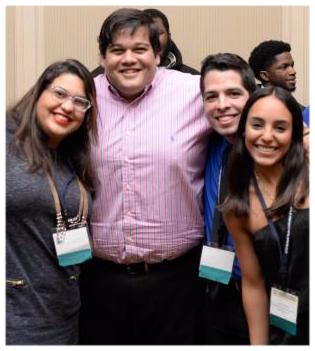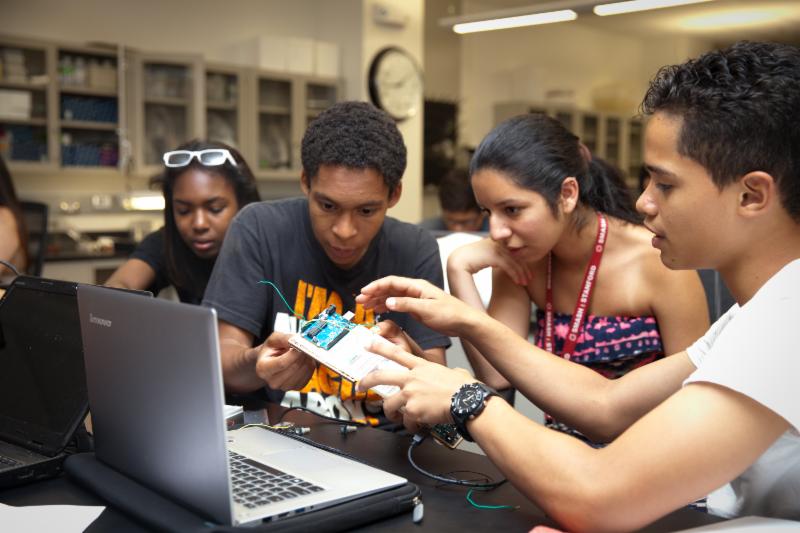|
April/May 2016
Volume 6, Issue 2
|
Welcome to the April/May issue of the CMD-IT eNewsletter!
Earlier this month CMD-IT held its annual Academic Careers Workshop, which kicked off on April 7th in Houston, TX. We had participants from about twenty
different universities.
In this issue we continue our meet the board series with Dr. Jeanine Cook. We also announce a new CMD-IT student initiative to engage students between Tapia Conferences as well as provide an up close look at the Level Playing Field Institute.
To include job openings or events to our Community Calendar for the June/July e-newsletter contact Heather Berry.
Best regards,
CMD-IT Leadership
|
 |
 |
|
2016 Academic Careers Workshop
CMD-IT, in collaboration with CDC, CAHSI, and AccessComputing, organized the 2016 Academic Careers Workshop for Underrepresented Participants (ACW) on April 7-10 at Hotel Sorella in Houston, Texas. The workshop included 23 individuals from 20 different academic institutions from across the United States.
This year we made several changes in the flow of the workshop based on feedback that we received from our 2015 workshop participants. We started by adding parallel sessions on Friday, that would allow us to have sessions focused on our mid to senior level participants about serving on national scale committees. In addition, changes were made to the flow of the panels to allow ample time for discussions with the participants. The changes were well received by the participants.
The ACW included sessions about navigating the tenure process, effective teaching, launching a research program, as well as a significant component focused on proposal writing
. In particular, this year the workshop included presentations on NSF and DARPA programs. Further, participants had an opportunity to hear from a former NSF program director about proposal writing. Lastly, the workshop included mock review panels whereby participants were given proposals prior to the workshop for review and discussion.
|
 |
|
CMD-IT Launches New Initiative to Engage Students Between
Tapia Conferences

While the ACM Richard Tapia Celebration of Diversity in Computing Conference is an excellent opportunity for diverse students in computing to meet other students, share successes and frustrations, and recharge their academic "batteries" for the next year, it is important for this engagement to continue after the conference, when students return to their respective universities.
CMD-IT is launching a new project focused on creating Virtual Teams that are designed to provide students with opportunities to maintain the connections from the Tapia Conference throughout the academic year. Each student group of approximately ten students will be paired with an academic or professional mentor, who will facilitate discussions, monitor engagement, and provide advice as needed. The goal is to facilitate retention in computing to degree completion. Students can sign up for the project via the Tapia Conference registration. For the first year of the project, we will limit the size to at most ten teams.
The project is being led by Dr. Ron Metoyer, Assistant Dean of Diversity and Special Initiatives and Associate Professor of Computer Science and Engineering at University of Notre Dame.
|
 |
 |
|
Level Playing Field Institute

Based in Oakland, CA, the Level Playing Field Institute (LPFI) is committed to eliminating the barriers faced by underrepresented people of color in STEM and fostering their untapped talent for the advancement of our nation. LPFI focuses on research on and programs for K-12 students, as well as higher education. The organization was founded by Freada Kapor Klein in 2001, whereby it was first known as the Institute for Inclusive Work Environments. Research at LPFI examines inequity in access and opportunity across K-12, higher education, and workplace contexts in order to improve the outcomes for underrepresented students in the fields of STEM. Through this extensive research, LPFI is able to identify and evaluate how to build effective programming.
One of LPFI's first programs was the Initiative for Diversity Education and Leadership (IDEAL). Founded on the UC Berkeley campus, IDEAL's goal was to help students navigate and graduate from higher education systems by providing scholarships and mentorship. In 2004, on the same university campus, LPFI launched the Summer Math and Science Honors (SMASH) Academy, a residential summer program modeled after Phillips Academy Andover's Math and Science for Minority students.
SMASH consists of a rigorous 5-week, 3-year summer STEM enrichment program that provides access to rigorous coursework and access to mentors, role models, and support networks of students of color. SMASH scholars remain engaged during the year through monthly STEM activities and workshops. The program not only reinforces the students' STEM academic identities, but also focuses on developing their critical thinking, civic awareness, leadership and sense of social responsibility. SMASH Academy exists at UC Berkeley, Stanford, and UCLA. Currently, LPFI is involved in an ambitious expansion campaign to bring SMASH to more campuses across the nation. For summer 2016, SMASH will expand to UC Davis and Morehouse College in Atlanta, the first campus outside of California.
The SMASH Pathways program targets students of color in eighth grade to provide access to hands-on activities, field trips, mentors, and role models.
S
MASH Pathways was created with a focus on building STEM awareness for prospective SMASH Academy applicants and parents prior to applying and making the full three year commitment. LPFI also includes initiatives like the Level the Coding Field hackathons, and SMASH:Connect, the alumni mentoring program. Currently, LPFI serves more than 600 students annually.
|
 |
 |
|
Stay Connected with CMD-IT
|
|